|
|
|
Sort Order |
|
|
|
Items / Page
|
|
|
|
|
|
|
| Srl | Item |
| 1 |
ID:
133625
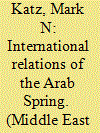

|
|
|
|
|
| Publication |
2014.
|
| Summary/Abstract |
Revolution does not just change things inside one country. It can disrupt international relationships throughout an entire region or even the world. What impact have the "Arab Spring" revolutions had on the international relations of the countries experiencing them, the Middle East, and the world? Have these upheavals been as disruptive of international relations as other revolutions? It will be argued here that, unlike what would occur if revolution succeeded in Syria or Bahrain, the Arab Spring revolutions that have succeeded in Tunisia, Egypt, Libya and Yemen have had a remarkably nondisruptive impact on international relations. To understand just how remarkable this is, though, something needs to be said about just how much revolution has disrupted international relations in the past.
|
|
|
|
|
|
|
|
|
|
|
|
|
|
|
|
| 2 |
ID:
133623
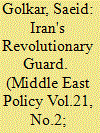

|
|
|
|
|
| Publication |
2014.
|
| Summary/Abstract |
During the past three decades, numerous Western media sources have portrayed Iranians as opposed to the United States, epitomized by a small group shouting "death to America." However, many Westerners who have traveled to Iran have seen a completely different picture, often finding that many Iranians have more positive attitudes.1 Many American visitors have described Iranians as the most pro-American people in the Middle East.2 Deep frustration with the Islamic Republic and mistrust of the clerical establishment's propaganda have made Iranians "avid fans of America: its culture, films, food, music, it's open, free-wheeling society
|
|
|
|
|
|
|
|
|
|
|
|
|
|
|
|
| 3 |
ID:
133628
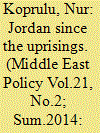

|
|
|
|
|
| Publication |
2014.
|
| Summary/Abstract |
The Islamist movement - in particular the Muslim Brotherhood - has begun to be seen as one of the main beneficiaries of the uprisings in the post-2011 Middle East. The Islamist group's support for public rallies (especially in Egypt, Tunisia and Syria) epitomizes a new era of challenge for the incumbent Arab regimes. Although it is too early to speak of structural change or a revolutionary era in the region, the events of the Arab Spring have highlighted the profound effect the Muslim Brotherhood Society (Jamaat al-Ikhwan al Muslimin) is having in most Middle Eastern countries.
|
|
|
|
|
|
|
|
|
|
|
|
|
|
|
|
| 4 |
ID:
133629
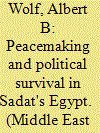

|
|
|
|
|
| Publication |
2014.
|
| Summary/Abstract |
What are the domestic political consequences of peacemaking for dictators? The conventional wisdom suggests that nations are better off reaching settlements that allow them to avoid the costs of war.1 The effectiveness of cooperation with autocracies is of interest to policy makers and international-relations theorists alike. Debates over issues such as the First Step Agreement with Iran or U.S.-China policy have focused on the effectiveness of engagement (defined as attempts to influence the behaviors of a target state through positive inducements).2 States sometimes cooperate with their rivals, expecting that engagement will bolster the political fortunes of moderates in the target regime
|
|
|
|
|
|
|
|
|
|
|
|
|
|
|
|
| 5 |
ID:
133626


|
|
|
|
|
| Publication |
2014.
|
| Summary/Abstract |
Even though demonstrations in Tunisia led to the resignation of President Ben Ali on January 14, 2011, no Western analyst would have believed that the "days of anger" summoned in Libya on February 17 would also result in a change of political power. The ruling tribal alliance that had been in place since Muammar al-Qadhafi's rise to power in September 1969 was so well-entrenched that an ouster by mass protest seemed impossible. It consisted of Qadadfa, Warfalla and Maqarha as well as loyal security forces, primarily the Revolutionary Committees under the command of Qadhafi and the military special brigades,1 mainly recruited from members of the Qadadfa tribe. Yet, ousted it was in the wake of an eight-month civil war caused by the bloody actions of the security forces against demonstrators, in particular in Benghazi after February 17. The protest was grounded in the deep discontent of the majority of the population with political paternalism, lack of liberty, severe human-rights violations, and the absence of economic and social development.
|
|
|
|
|
|
|
|
|
|
|
|
|
|
|
|
| 6 |
ID:
133620


|
|
|
|
|
| Publication |
2014.
|
| Summary/Abstract |
I will focus my remarks on Gulf anxieties as they relate to U.S. foreign policy in the Middle East, specifically as they relate to U.S. policy vis-à-vis Iran, which is very much a hot topic. There are some deep structural sources of anxiety that have created tensions in the relationship between the United States and our closest partners in the Gulf. There is a widespread perception in the Gulf region that the United States is simply politically exhausted with the Middle East as a whole and with the Gulf in particular, after more than a decade of war in Iraq and Afghanistan. I think they see the U.S. drawdown from Iraq and the imminent drawdown from Afghanistan, and they wonder when the United States will start to draw down its 35,000 soldiers, sailors, airmen, Marines and others who are every day on mission in the Gulf region.
|
|
|
|
|
|
|
|
|
|
|
|
|
|
|
|
| 7 |
ID:
133622
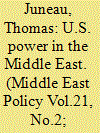

|
|
|
|
|
| Publication |
2014.
|
| Summary/Abstract |
It has become common to hear that American power in the Middle East is waning. The recent U.S.-Russia deal on the elimination of Syria's chemical-weapons program, for example, has even led some to talk of U.S. weakness in the region.2 This article instead argues that American power in the Middle East is not declining but is, in fact, slightly increasing, due principally to U.S. military domination, the strong positions of its regional partners and the stagnation or decline of its rivals. It is true that U.S. ambition in the Middle East is diminishing, albeit only slightly. This is distinct, however, from power. A pronounced and durable decrease in U.S. regional ambition, moreover, is not sustainable. Because of structural pressures, it is difficult for the United States to more than marginally reduce its regional presence. It is not losing its grip on the Middle East but trying, with only partial success, to loosen it.3
|
|
|
|
|
|
|
|
|
|
|
|
|
|
|
|
| 8 |
ID:
133621
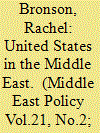

|
|
|
|
|
| Publication |
2014.
|
| Summary/Abstract |
Recent events in Ukraine have brought America's growing energy independence and its resulting geopolitical influence into sharp relief. Almost immediately after Moscow invaded Crimea, leaders on both sides of the Atlantic began urging Washington to strengthen its allies and weaken Russia's dominance by deepening its energy ties to Europe. In a letter sent to House Speaker John Boehner and Senate Majority Leader Harry Reid, the ambassadors from Poland, Hungry, the Czech Republic and Slovakia called on the United States to strengthen its "gas-to-gas competition" to enhance European energy security.1 President Obama echoed their call: "Energy is obviously a central focus of [American and European] efforts" vis-à-vis Russia.2 The United States has an opportunity to use its newfound energy assets to shape the political chessboard in ways unforeseen just a few years ago.
|
|
|
|
|
|
|
|
|
|
|
|
|
|
|
|
| 9 |
ID:
133630


|
|
|
|
|
| Publication |
2014.
|
| Summary/Abstract |
The Middle East has been among the most arid regions of the globe for several thousand years. Nevertheless, recent extreme events portend a significant decline in the region's available water resources and a meaningful change in its climate. In 1992, centuries-old underground springs feeding the Azraq wetlands in Jordan stopped flowing entirely. In the years since, similarly age-old springs in other parts of Jordan, including Jerash and Kerak, have also stopped flowing. During the 1990s, the Khabour River in Syria, a major tributary of the Euphrates, completely dried up for several years. And from 2006 to 2010, a ruinous drought severely ravaged areas of Jordan, Israel, Syria, Iraq and Turkey, displacing millions of people and devastating livestock and crops.
|
|
|
|
|
|
|
|
|
|
|
|
|
|
|
|
| 10 |
ID:
133624


|
|
|
|
|
| Publication |
2014.
|
| Summary/Abstract |
Hassan Rouhani's victory in the June 2013 Iranian presidential election surprised many who expected that the Islamic regime's supreme leader, Ayatollah Ali Khamenei, would ensure a strong conservative candidate would win. With most candidates - including former President Ali Hashemi Rafsanjani and Esfandiar Mashaie, Mahmoud Ahmadinejad's preferred successor - disqualified by the Guardian Council, the approved slate consisted of eight men. Two would subsequently withdraw, leaving a choice among six candidates on election day. Of these, Rouhani was the only candidate who could be described as a moderate. Although it is not surprising that Iranian voters would support Rouhani in this field, the 2009 election had convinced many that the actual votes were irrelevant. Having overseen the consolidation of conservative control of Iran's elective offices, and having warned repeatedly that a "velvet revolution" posed the greatest threat to the regime, Ayatollah Khamenei seemed certain to engineer another conservative win. Therefore, the official announcement that Rouhani had secured an absolute majority of the votes, more than three times the total of any other candidate, to win the election without even a runoff was stunning.
|
|
|
|
|
|
|
|
|
|
|
|
|
|
|
|
| 11 |
ID:
133627


|
|
|
|
|
| Publication |
2014.
|
| Summary/Abstract |
The final session of Yemen's National Dialogue Committee concluded on January 25, 2014, with an agreement on a basic constitutional document describing a unified but federated and democratic Yemen. To be sure, there are issues still to be worked out: the number of states to be federated - with some southerners still holding out for two (north and south) and others insisting on four or six - and an arrangement with the Houthi tribe in the north defining their state and the parameters of their local government. U.S. diplomacy has not, to date, contributed to the resolution of these two nagging problems. There will, however, be ample opportunity to help ease the tensions of regionalism with track-two-type ideas and projects to help establish trust among the conflicting regions. Keeping Yemen together is in the U.S. national interest, and spending economic and political resources towards that end is therefore worthwhile.
|
|
|
|
|
|
|
|
|
|
|
|
|
|
|
|
|
|
|
|
|